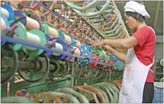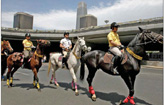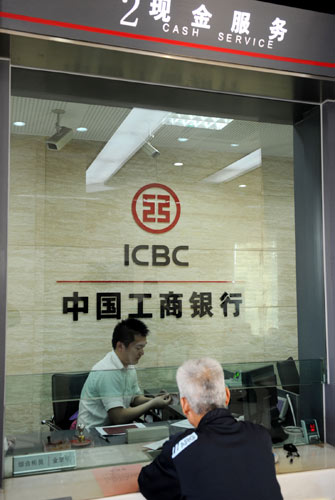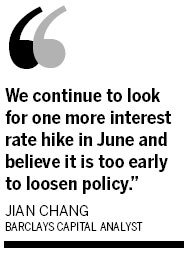Business
Money growth slows in May
Updated: 2011-06-14 08:03
By Aileen Wang and Koh Gui Qing (China Daily)
|
|
Taming inflation remains nation's top priority despite slowdown signs
BEIJING - China's money growth slowed to a 30-month low in May and banks extended fewer new loans than expected as tight monetary policy weighed on bank lending. However, stubborn inflation is expected to persuade the government to keep its foot on the credit brakes.
Although there are signs that growth in the world's second-biggest economy is cooling slightly, analysts said taming price pressures remains a top priority for China, especially as policymakers see little chance of a sharp slowdown for now.
"We continue to look for one more interest rate hike in June and believe it is too early to loosen policy," said Jian Chang at Barclays Capital in Hong Kong, while noting there was a chance the rate increase could be delayed until July.
The timing of the next rate rise could well depend on May inflation data, scheduled for release on Tuesday. Analysts polled by Reuters predicted that annual inflation edged back up to 5.4 percent in May, the highest in more than 30 months, and a government researcher said that it may accelerate to more than 6 percent in June, according to remarks reported on Sunday.
Investors are eyeing Chinese data and its policy stance even more closely than usual amid signs of a global slowdown.
Chinese banks extended 551.6 billion yuan ($85.1 billion) worth of local currency loans in May, figures from the central bank showed.
Annual growth in China's broad M2 measure of money supply slowed to a 30-month low of 15.1 percent in May, while outstanding yuan loans at the end of the month grew 17.1 percent from a year ago.
The median forecast of economists was for a 15.4 percent rise in M2 and a 17.1 percent growth in outstanding loans.
Most analysts said that the moderation in money growth and bank lending were more a result of Beijing's lending restrictions rather than a drop off in demand for loans.
"It is still too early to say that the loan demand is declining because of a slowing economy," said E Yongjian, an analyst at Bank of Communications in Shanghai. "We should not read too much into a single month's loan data."
Indeed, record annual profits for Chinese banks suggest that Beijing's clampdown on credit has not hurt lending. Despite lending less, banks are benefiting from buoyant demand for loans and are charging higher interest rates.
In past years, Beijing has steered bank lending by announcing an explicit loan target for banks. It refrained from doing so this year, after banks exceeded last year's target of 7.5 trillion yuan by lending 7.9 trillion yuan.
|
|
Even so, analysts believe that Beijing's implicit lending target for 2011 is about 7.5 trillion yuan, with a target M2 growth of 16 percent.
With such solid growth in money supply, some analysts said China is far from sliding toward a "hard landing".
Li Huiyong, an analyst at Shenyin & Wanguo Securities Co in Shanghai, estimates that M2 growth of between 13 and 15 percent will keep China's economy growing at between 9 and 10 percent.
"We continue to believe that the chance of a hard landing is very small," said Ting Lu, an economist at Merrill Lynch-Bank of America.
Lu said the slackening in M2 could be a result of households moving their savings to wealth management products, which are excluded in the calculation of M2.
Meanwhile, to quell inflation, China has raised interest rates twice and increased banks' required reserves five times this year. It has also ordered banks to cut lending to local governments and property firms.
Li Xunlei, an analyst at Guotai Junan Securities in Shanghai, estimates that the latest pull-back in money growth could show up as slower inflation six months from now.
But Tim Condon, a regional economist at ING in Singapore, noted that much of China's inflation is driven by food prices.
"It's not money. It's really food that is driving inflation. There is not much monetary policy can do about it," he said.
"They have done a lot (on the policy front). Do they risk over-tightening if they continue? Maybe it's time to wait and see."
Reuters
Specials

Wealth of difference
Rich coastal areas offer contrasting ways of dealing with country's development

Seal of approval
The dying tradition of seal engraving has now become a UNIVERSITY major

Making perfect horse sense
Riding horses to work may be the clean, green answer to frustrated car owners in traffic-trapped cities

